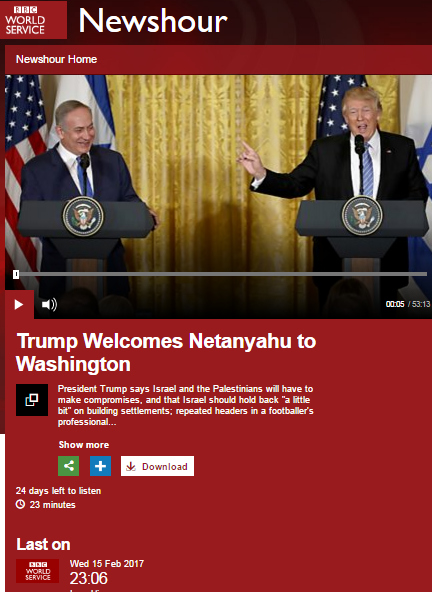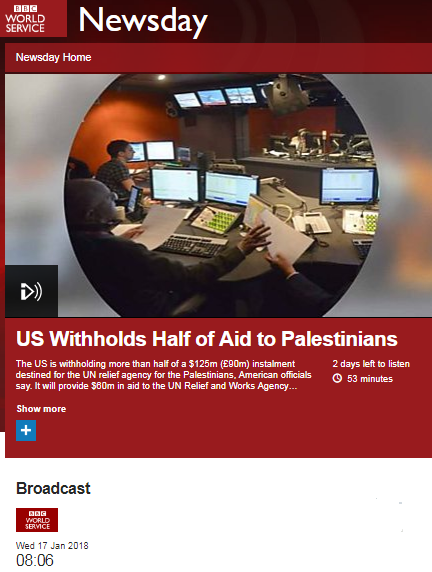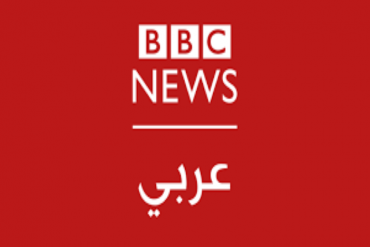As has already been documented here, following last week’s visit by the Israeli prime minister to the White House both the BBC News website and BBC Radio 4 told their audiences of a “major policy shift” on the part of the US administration. [emphasis added]
“A White House official says a two-state solution may not be the only option to solve the Israel-Palestinian conflict, signalling a major policy shift.”
“US President Donald Trump has dropped decades of US policy insisting on a two-state solution to the Israeli-Palestinian conflict.”
“…President Trump appeared to tear up what has been the US foreign policy objective under his three most recent predecessors – Democrat and Republican alike.”
Listeners to the BBC World Service radio programme ‘Newshour’ on February 15th heard similar messaging in the lead story (from 01:22 here) which was introduced by Paul Henley as follows:
“First, President Trump has given a warm welcome to the Israeli Prime Minister Benjamin Netanyahu who is on a visit to the White House. The two leaders held a joint news conference full of mutual praise.”
Following a number of audio clips from the press conference, the item continued:
Henley: “Probably the most eagerly awaited question was whether President Trump would change the US’s long-standing policy of promoting a two-state solution to the conflict between the Israelis and the Palestinians. This is how he responded.”
Trump: “I’m looking at two-state and one-state and I like the one that both parties like. I’m very happy with the one that both parties like. I can live with either one. I thought for a while that two-state looked like it may be the easier of the two. But honestly, if Bibi and if the Palestinians…if Israel and the Palestinians are happy, I’m happy with the one they like the best.”
Henley: “So what is the reaction to what’s been interpreted by some as the ripping up of 30 years of US policy on Israel? Our correspondent in Jerusalem, Jonny Dymond, has been giving me his assessment.” [emphasis in bold added]
That messaging was then reinforced by Jonny Dymond. [emphasis in bold added]
Dymond: “I think it represents a pretty serious shift – albeit one which was perhaps clouded by Trump’s oratorical style. Before we’d heard from President Trump and from the unnamed White House official who trailed this policy shift, the policy was pretty clear. It was that there was a two-state solution and that’s what negotiations would drive towards. Ah…ah…the State of Israel and a Palestinian state emerging next to it and the Palestinians had signed up to that, the Israelis had signed up to that with some caveats.”
Like his colleagues from the BBC News website and BBC Radio 4, Dymond presented “the Palestinians” as a homogenous group, refraining from pointing out to audiences that the Palestinian faction which gained the most votes last time elections were held certainly has not “signed up” to the idea of a two-state solution or that Hamas’ rival faction Fatah refuses to countenance a crucial component of the two-state solution concept: recognition of Israel as the Jewish state. He went on:
Dymond: “It was US policy, it was the policy of the EU, it was the policy pretty much agreed upon by a number of Arab states as well. Ehm…now the president has said ‘well, take your pick; one-state solution, two-state solution’. He has effectively said the US no longer has an end point for negotiations. It will no longer drive negotiations towards any particular end point. And that is a pretty big shift in policy given that the two-state solution has been the policy for – what? – three decades or so.”
Once again BBC audiences were told that the two-state solution has been accepted policy for decades despite the fact that the Oslo Accords of the 90s make no reference to a two-state solution, leaving the issue of the final, permanent status of the territories to be negotiated between the parties.
The item continued with Dymond – in accordance with what is now standard BBC framing – describing Area C as “Palestinian land” despite the fact that under the terms of the Oslo Accords, its final status is to be resolved through negotiations.
Henley: “And we hear that many in the Israeli government are cheered by the presence of Donald Trump in the White House and his obviously warm stance towards Israel. Are they cheered because there’s any more prospect of a peaceful resolution to this long-running conflict or simply because they think that Donald Trump will fight their corner?”
Dymond: “Oh very much the latter; that they think that Donald Trump is a supporter of Israel and will not place what they see as undue pressure on Israel over issues such as building in Palestinian land – the settlements – and forcing Israel to make painful compromises towards an eventual deal. And I think we saw and heard in the news conference which the two men gave an extraordinary level of amity from Donald Trump towards both Mr Netanyahu as an individual and also towards Israel in general. The language was extraordinary and the one moment where he mentioned the possible compromise…ah…which was on the issue of building in Palestinian land known as settlements, he said I’d like to see you pull back on settlements for a little bit. It was hardly the kind of hard line with which Mr Netanyahu was greeted when he went to see Barack Obama and they made it very clear – the administration then made it clear that as far as they were concerned, settlements were a red line. There was nothing like this. This is a much, much more friendly administration for Israel in general and for Mr Netanyahu in particular.”
As we see in this item and others (see ‘related articles’ below), February 15th brought multi-platform BBC promotion of the inaccurate notion that the US administration had changed its policy regarding the two-state solution as well as inaccurate portrayal of the Oslo Accords as including the two-state solution and inaccurate claims of a Palestinian consensus regarding acceptance of the two-state solution.
Clearly the editorial policy behind all those reports was based on narrative rather than fact and clearly none of these reports contributed to meeting the BBC’s remit of providing its audiences with accurate and impartial information which would enhance their understanding of the topic of the two-state solution.
Related Articles:
BBC News and the US ‘major policy shift’ that wasn’t
BBC Radio 4 amplifies PLO interpretation of the two-state solution




